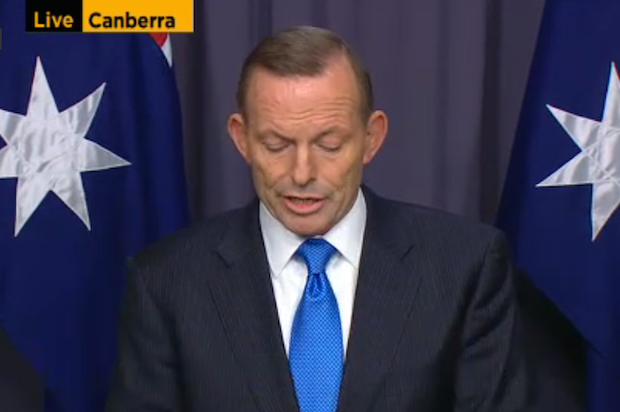Farewell, Tony Abbott.
The 28th prime minister of Australia ruled for just under two years. Like Kevin Rudd and Julia Gillard before him, he was brought down by plotters within his own party.
Few close observers of politics were surprised. Australian politics is now synonymous with instability. Abbott has been living on borrowed time ever since the spill against him in February revealed the scale of backbench dissatisfaction with his leadership.
At the time, we argued that “it would be astonishing” if Abbott lasted more than the six months he asked of his colleagues to re-establish his popularity in the electorate. In the end, he was granted all six and an extra seventh. But the polls didn’t budge, and the gaffes kept coming. For several weeks now Abbott was looking more isolated and out of touch than ever.
How can we judge Tony Abbott as prime minister? Simply, as a failure.
Tony Abbott was the most conservative Australian prime minister in a generation. He was far more conservative in office than John Howard, and he made Malcolm Fraser look almost like a leftist.
Abbott’s self-professed heroes were conservatives such as Robert Menzies and B.A. Santamaria, but Abbott was far to the right of either of them. Menzies was a social conservative who none-the-less expanded university education and supported a healthy manufacturing sector protected by high tariffs. Santamaria believed that the laissez faire free market was barbaric, and should be curbed by strong government regulations. Neither would have easily recognised the modern Liberal Party led by their disciple.
Abbott came to office with a healthy majority, promising to end the instability of the Rudd-Gillard years and restore the kind of boring, prosperous conservative government Australians enjoyed under John Howard. He failed on both counts.
Ironically, Abbott’s strongest pre-election campaign plank was the one that he could not secure: leadership stability, and an end to the “soap opera” of speculation, spills and late night changes to the nation’s leadership.
There was a reason it all went so wrong, so quickly. Like Shakespeare’s Cassius, the fault was not in Abbott’s stars. Abbott turned out to be a deeply flawed political leader, as most who followed his career had always suspected.
He squandered political capital like almost no other prime minster in modern Australian history (and that’s saying something, in the time of Rudd and Gillard). His honeymoon period was so short as to be almost indiscernible. Just months after he took office, voters were already turning off.
The reason for the early and dramatic fall in the Coalition’s popular support is clear enough: broken promises. Abbott’s entire prime ministership was based on a lie: the idea that he would keep most of Julia Gillard’s policy agenda, minus a few nasty imposts like the carbon price and mining tax.
Voters liked his policies of tougher border security and killing off the carbon tax, but they were also reassured by his promises of no cuts to health, education and the ABC.

Instead, almost as soon as he took office, Abbott and his team unveiled a policy agenda far to the right of the plan they had presented to voters.
No hint had been given that the Coalition would impose a deep and nasty program of austerity on the electorate. No word had been spoken of policies like a $7 co-payment for visiting the doctor, huge increases to university fees, $50 billion cuts to health spending, changes to pension indexation, cuts to family payments, or forcing under 30-year olds to wait six months to receive the dole. Nor had the Coalition campaigned on an endless culture war, prosecuted against the enemies of conservatism in the media, academia, and civil society.
When these measures were revealed in the months after the election, and especially in 2014’s Commission of Audit and Joe Hockey’s horror 2014 budget, the Coalition’s support in the polls collapsed. It has never recovered.
A nimbler leader might have been able to pivot after the disasters of 2014, replacing Joe Hockey and tacking social policy back towards the centre. Voters might even have rewarded a leader prepared to acknowledge mistakes, and move policy back towards moderation.
But Abbott has always lacked that kind of flexibility. His style has never been tailored to retail politics: he was a fighter, not a charmer, a gifted sloganeer who could cut through on television appearances with perfectly crafted sound bites, but not one that could explain, or even reason.
In the run of media commentary that normally marks such leadership changes – they have become almost routine events now – analysis typically rests on style and imagery. Failed leaders are almost always called poor communicators; they are decried as being “out of touch.”
Tony Abbott was certainly that. But substance, not style, was the core of his downfall. Abbott was removed by his party, not because of what he said and the way he said it, but because he was deeply unpopular with voters.
Tony Abbott was unpopular because of his policies.
Australian citizens hated the austerity imposed without warning and with conspicuous venom in 2014. They hated the idea that young people might be denied the dole for six months, simply because they were looking for work. They hated the cuts to Australia’s remnant social welfare state: the cuts to health, to education, to public broadcasting, to the pension, and to family payments. They were dismayed at attempts to ratchet up the price of university degrees. They were worried about the deep cuts to science, technology and public research.
Increasingly, voters are worried about the possibility of a recession. And yet still the government has no meaningful economic policy, beyond a few hand-outs for small businesses and the chimera of free trade deals in Asia.
As Abbott departs the top job in Australia’s government, it’s worth reflecting on what can only be described as two dismal years.
His chief achievements were negative: the demolition of pollution controls, the sabotaging of industries and the punishment of perceived enemies. As a result, his time in office will be remembered mainly for broken promises, deep unpopularity, and personal eccentricity.
As prime minister, Abbott supported the closure of Australia’s car making industry, the evisceration of the entire renewable energy sector, and the decay of many of the nation’s non-mining exporters. He pushed through many bad laws, but achieved few policy reforms. His record in economic policy was unalloyed failure: unemployment up, the deficit up, exports down, investment down, confidence down, a housing bubble poised to bust.
As the economy faltered, Abbott tried to compensate by ramping up a macho security rhetoric utterly out of step with Australia’s rather boring geopolitical reality. The victims of this rhetoric were innocent people, such the refugees seeking shelter on our shores, as well as the human rights of ordinary citizens, who now have their emails and social media spied upon.
But voters never warmed to his increasingly paranoid warnings of “peaceful invasions” and the spectre of the “Daesh death cult.” Despite all the flags and the uniforms, the opinion polls showed that Australian citizens didn’t believe the big lie that Australia was truly threatened by insurgents fighting thousands of kilometres away in Syria and Iraq.
Nor did all the military posturing help Abbott run a disciplined government. Far from it. In its latter months, his government became a caricature of the chaos he had attacked under Labor. There was centralisation, but there was little real leadership.
Real leaders take hard decisions, like sacking deadweight members of cabinet and responding to reality as it presents itself. Abbott retreated into the bunker, both metaphorically and literally.
Paralysed by his own weaknesses and captured by the restrictions he had imposed on himself, by mid-2015 the Abbott government was a bizarre collection of talking points about terrorism, weekly announceables, and almost no policy of substance.
There were cabinet meetings without any agenda items, and policies announced via the front page of the Murdoch tabloids. Leaks were so common and so expected that people came to believe that they came straight from Abbott’s office.
In the downfall of Tony Abbott there is much for moderate and progressive Australians to celebrate. His unique brand of zealous conservatism, reflexive austerity and paranoid culture war was rejected by the majority of Australians, especially by the poorest and most vulnerable he sought to punish most.
Tony Abbott led a vicious, punitive and inequitable government. He blew out the deficit while savaging the poor and the needy. He rewarded mining barons with tax cuts and environmental deregulation, while presiding over an increase in fossil fuel pollution. He claimed Australia was open for business, while the unemployment rate rose to a 12-year high.
Tony Abbott sought to divide Australia against itself, to scare and intimidate us, to strip away our rights and tear holes in our social safety nets. Seemingly unable to unite or to inspire, he doubled down on division and fear. In the end he was supported only by the rump of the Liberal hardliners: a bare two score of right-wingers who couldn’t countenance a Turnbull leadership, and who would rather follow Abbott to a first-term defeat.
Tony Abbott was a mean, nasty and dishonest prime minister. His time in office made Australia a sadder and less secure place. When his domestic failures became manifest, he involved Australia, without Parliamentary debate, in a foreign war.
Good riddance to Tony Abbott. He will not be missed by many.
Donate To New Matilda
New Matilda is a small, independent media outlet. We survive through reader contributions, and never losing a lawsuit. If you got something from this article, giving something back helps us to continue speaking truth to power. Every little bit counts.




